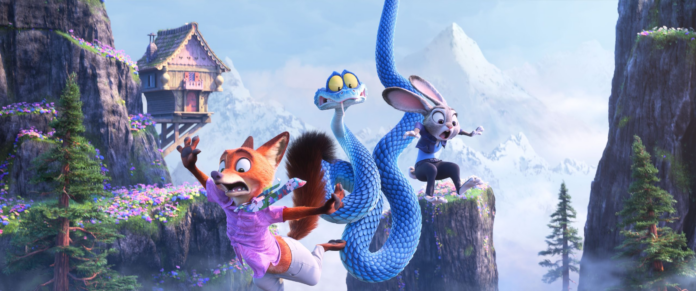Aesop got it. You can use cute talking animals to teach important life lessons. So when Disney once again opens the gates to a city filled with conversational critters for Zootopia 2, you know there’s more than just sight gags and big adventure.
The first film was released in 2016, and with co-director Rich Moore and co-writer Phil Johnston having departed Disney (for Sony and Netflix, respectively), Zootopia scribe Jared Bush takes over sole writing duties while joining returning director Byron Howard at the helm. That pairing gives an undoubted sense of continuity. It’s needed, since the near-decade gap between films is only a week in the city of Zootopia, a place where all animals coexist in their comfortable, climate-controlled zones. That utopia is all the work of the Lynxley family, and if the city’s benefactors want to expand their frozen tundra sector, who’s to complain? Especially since the only creatures to be dispossessed are the underclass out in Marsh Market, and some of them are (ew) lizards.
Zootopia was, at heart, about how people can be more than the expectations laid at their door. Boisterous and brave bunny Judy Hopps (Ginnifer Goodwin) was always going to be a meter maid, and streetwise fox Nick Wilde (Jason Bateman) was always going to be a petty criminal, and it took them teaming up and saving the city for anyone to see otherwise. Now they’re both cops and partners, and they’re investigating what could be the first snake in Zootopia in a century. A terrible crime and a whisper campaign led to snakes’ exile and now gentle pit viper Gary De’Snake (Ke Huy Quan) must prove that reptiles belong just as much as any other animal.
The first film was both a fun and furry buddy cop romp and a gentle metaphor for acceptance and cohabitation. Zootopia 2 goes further down that path in a fashion that is unabashedly moralizing when it comes to how some groups are excised and othered in a community, and how gentrification can be a tool of oppression. However, it’s done in no more overt a way than how Lady and the Tramp took on class, or Elemental explored how migrant communities integrate while retaining their identity. It’s the kind of important lesson, wrapped up in humor and compassion, that no studio does as well as the House of Mouse. After the heavy-handed anti-colonial subtext of Frozen II and the utter hollowness of Wish, it’s somehow reassuring to know that Disney can still be a moral compass.
True, Zootopia 2 does fall prey to the modern plague of an excess of celebrities in bit parts. (Did we really need WWE wrestlers CM Punk and Roman Reigns for a handful of lines as the Zebros?) However, that expanded recording booth is lucky to have the always endearing Quan, as well as Fortune Feimster as a conspiracy-peddling beaver.
But the heart of the story remains Hopps and Wilde, and the sparkling, witty, and endearing energy between them. Her belief that Nick can change is predicated on the unspoken idea that he can change to be like her, an idea at odds with the film’s subtext of acceptance. However, her big heart and valiance mean she never becomes less of a hero as she and Nick navigate the mystery, their own shortcomings, and their interspecies romantic tension, which Bush’s script also deftly navigates.
And a quick note to anyone who thinks that the story of rich beasts holding on to power by demonizing a minority is too pointedly political. Maybe you should listen to the bunny.
This article appears in November 28 • 2025.




